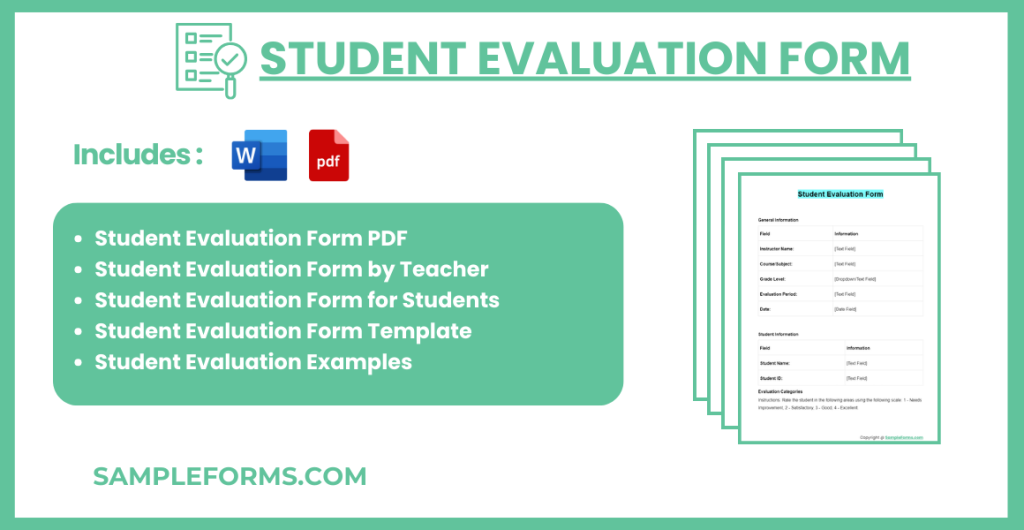
Embarking on the journey of student assessments? Dive into our detailed guide on Student Evaluation Forms, designed to simplify the evaluation process for educators and students alike. With actionable examples and insightful tips, we unlock the potential of effective assessments. Learn how to craft, utilize, and benefit from Evaluation Form and Self Evaluation Form, enhancing the educational experience with precision and ease. This is your first step towards mastering student evaluations.

A Student Evaluation Form is a structured tool used by educators to assess, track, and improve students’ academic performance, behavior, and skills. These forms serve as a critical feedback mechanism, enabling teachers to provide constructive evaluations tailored to each student’s learning journey. By systematically documenting progress and areas needing attention, Student Evaluation Forms foster a supportive learning environment that encourages growth and achievement. Simple yet powerful, these forms are essential in the educational toolkit for enhancing student outcomes.
A comprehensive Sample Student Evaluation Form might include the following sections to effectively assess a student’s performance and progress:
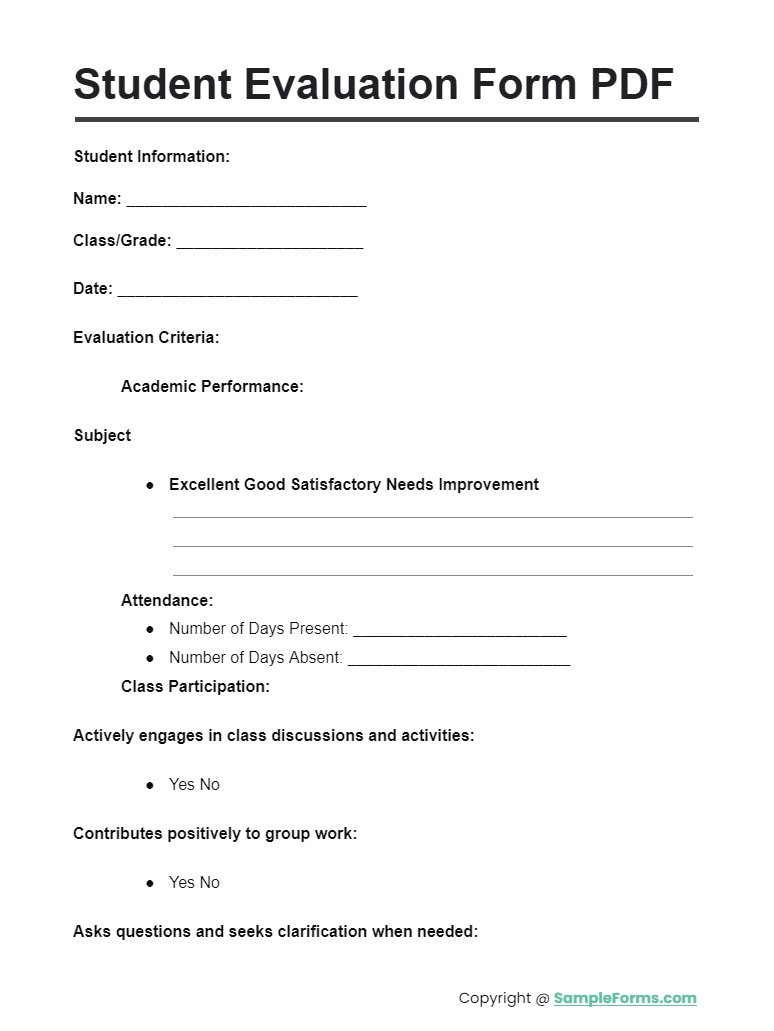
Unlock the power of comprehensive assessment with our Student Evaluation Form PDF, seamlessly integrating Training Evaluation Form and Employee Evaluation Form elements. This guide ensures educators and administrators have the essential tools for thorough and effective student evaluations.
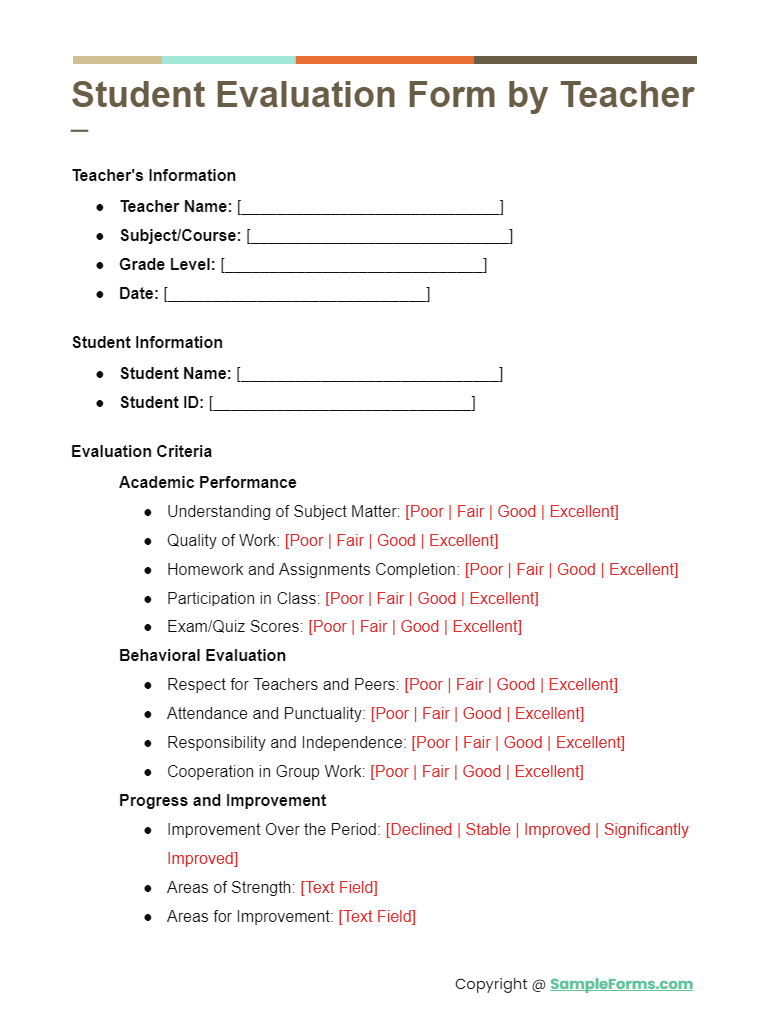
Our guide to the Student Evaluation Form by Teacher incorporates critical aspects of Peer Evaluation Form and Employee Self Evaluation Form, providing educators a holistic tool for assessing student performance while fostering self-awareness and peer feedback.
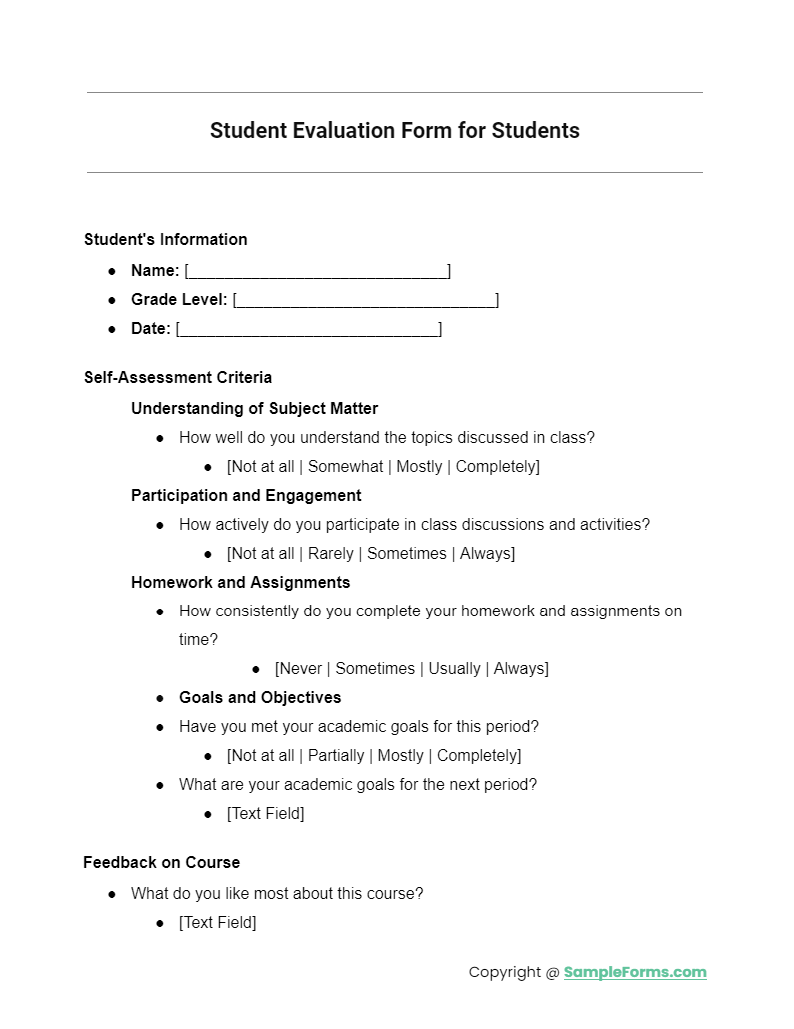
Explore our Student Evaluation Form for Students, designed to echo the structure of Employee Performance Evaluation Form and Call Monitoring Evaluation Form. This resource empowers students to engage in self-assessment, enhancing their understanding of personal achievements and areas for growth.
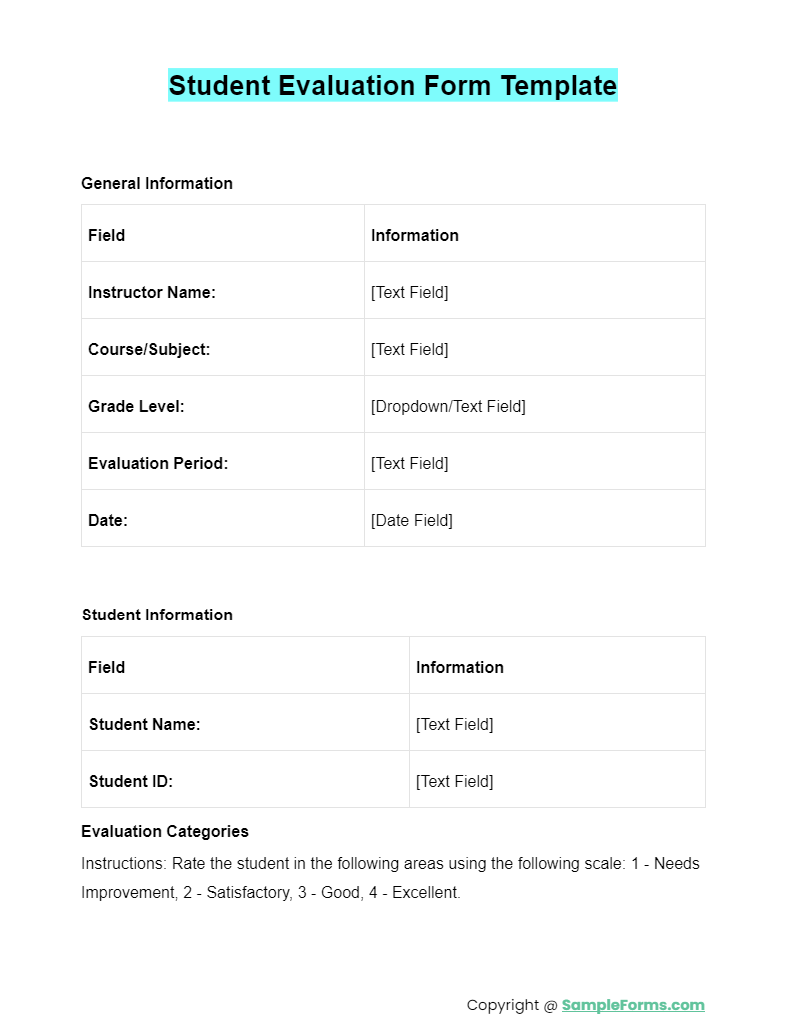
The Student Evaluation Form Template is an indispensable tool, blending elements from the Interview Evaluation Form and Speech Evaluation Form. It offers a versatile framework for educators to customize assessments across various contexts and subjects.
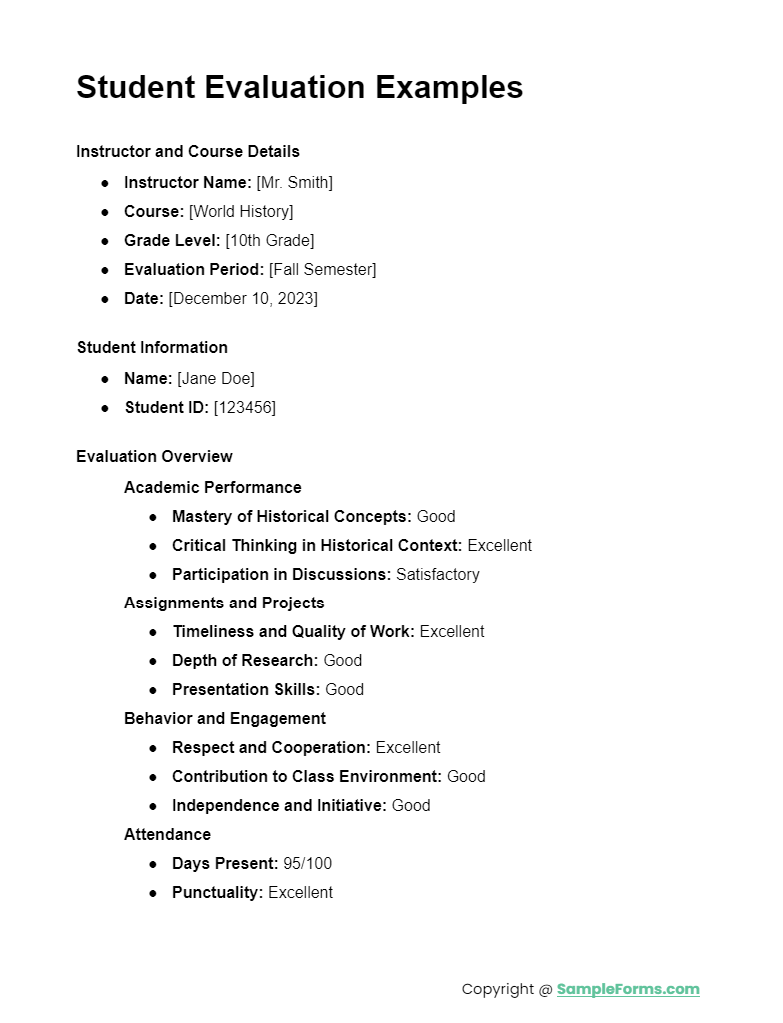
Dive into our diverse Student Evaluation Examples, featuring methodologies from Food Evaluation Form to Internship Evaluation Form. These examples provide a rich resource for educators seeking innovative ways to measure and enhance student engagement and learning outcomes.
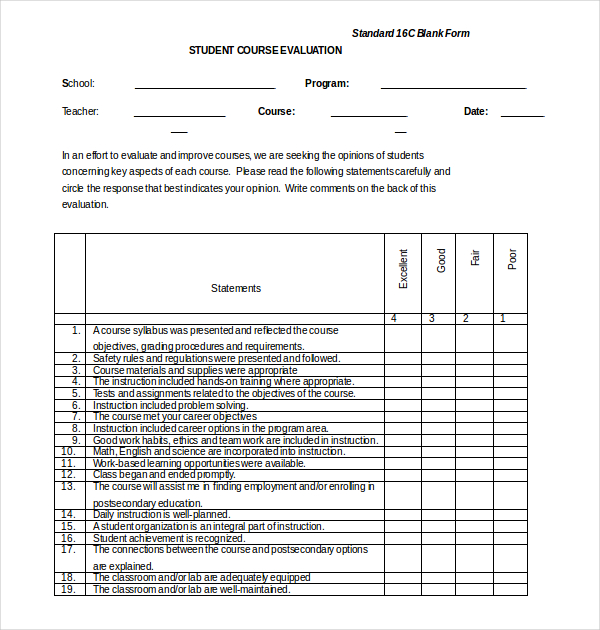
Students who are in an academic set-up are required to fill this form for a better education system. The form is for assessing the faculty, punctuality of classes, course material, safety rules, classroom equipment, individual student help, student given time to ask questions etc. These forms are to be filled by students only. These forms are private and confidential.
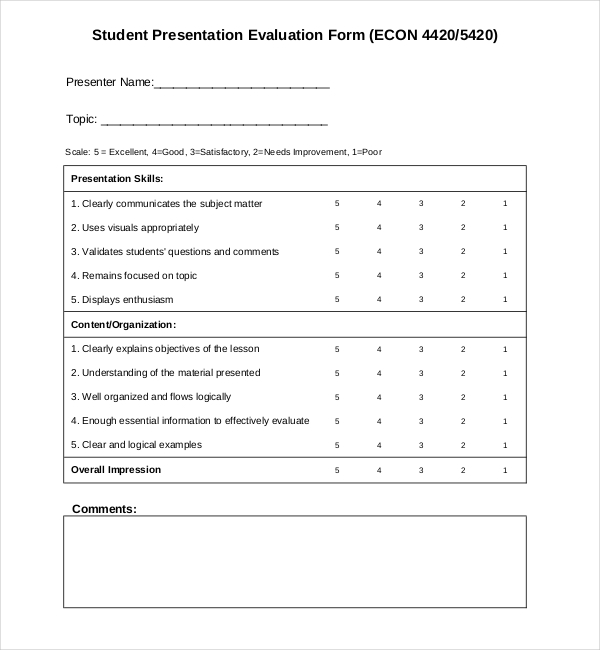
Many students have to attend seminars for academic purposes. These forms are for assessing these presentations. The forms are to be filled by students based on how they felt about the overall presentations. They are free to fill negative points here since it is a feedback for them. Constructive criticism is welcomed.
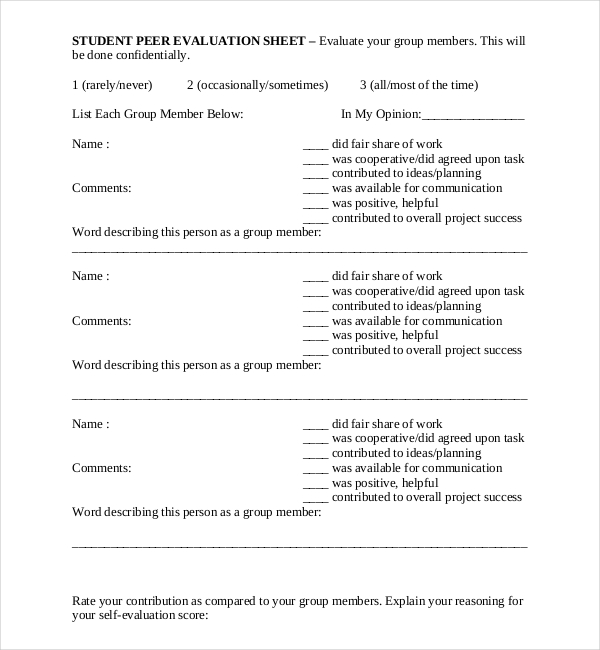
Often students have to deal with their peer group. In this case, they have to assess their peer group. In this form, the student has to evaluate their peer members so that the institution knows about their individuals when they are in a group. The peer group is evaluated upon their share of work, cooperativeness, contribution, communication, project success. The names and comments are required for further understanding.
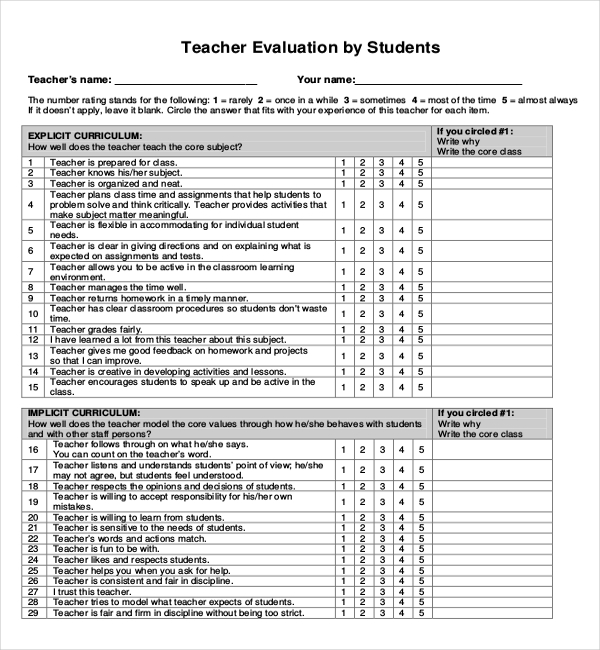
The tasks of teacher are to observe a student and try help them in every way possible. But sometimes it is confusing on how to evaluate them. It is at this time when this form comes handy. The teachers will be able to assess their students with ease by covering all the aspects through the form. Useful Teacher Evaluation Forms
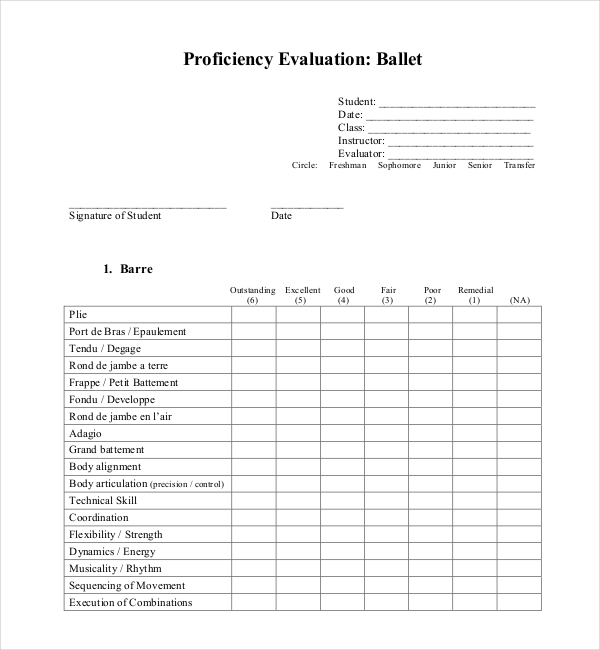
Ballet is an artistic form of dance form originating from Italy. The students who learn ballet are evaluated by their evaluator in various aspects of the dance. The students are analyzed on Barre, Center and Participation skills. A comment section is provided for additional information.
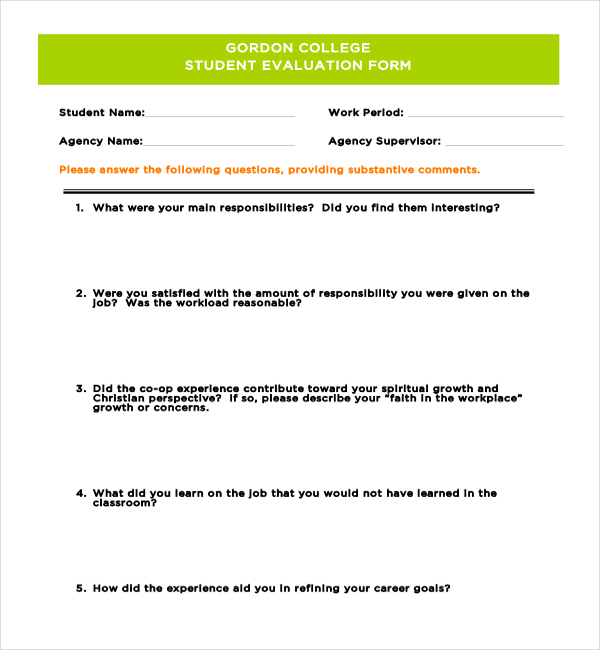
The forms help in determining the true scenario of a college and their students. This form by Gordon College needs to be filled up by students based on their college experience. Any suggestion regarding the improvement of the college is appreciated. This form may be used in the literature marketing in the cooperative education program.
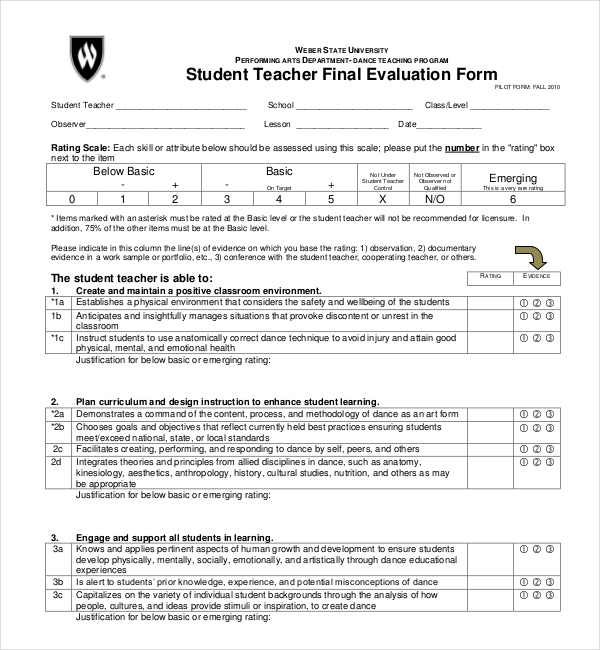
This dance evaluation forms are for students who are seeking to learn dance from Weber State University. The form is to assess a student in terms of their dancing abilities and learning capabilities. The forms are duly signed and submitted by the observer. There should not be any qualms in writing down extra remarks.
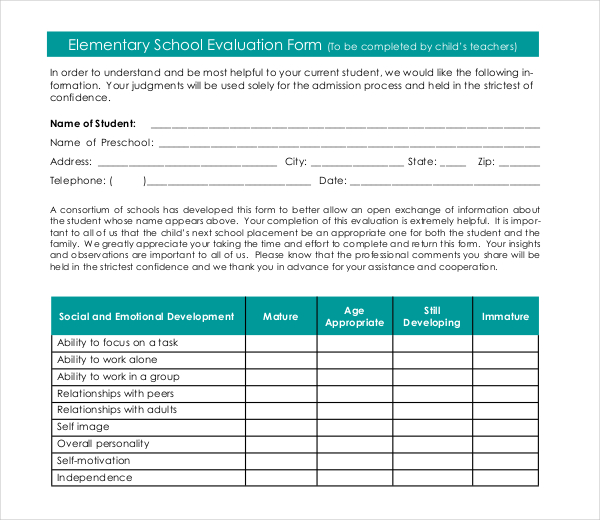
For little kids who have just entered the educational set up would require extra care. This means the school requires elementary student evaluation form. This form focuses on the all-round development of the student so that further help is given to them if required. The relationship of student with peers, adults, group, alone etc. are looked upon by the observer/evaluator.
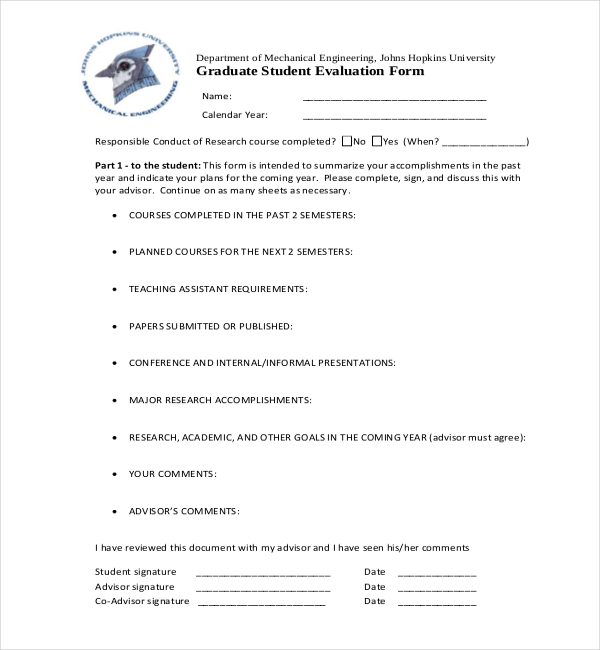
Johns Hopkins University presents the graduate evaluation form that is made to assess students in a college set up about their plans in future. The plans for the coming year are asked to the students. These forms will help the college to analyze the students’ needs and accordingly design courses in future.
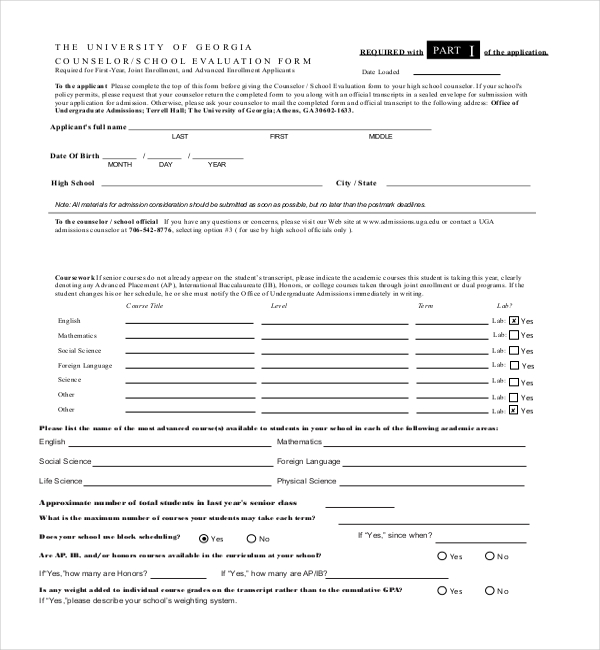
The students who are going to enter high school or are in their high school years need to be assessed by the counselors. They are noted for their skills and weaknesses. An additional space is given for the teachers to ask about the students.
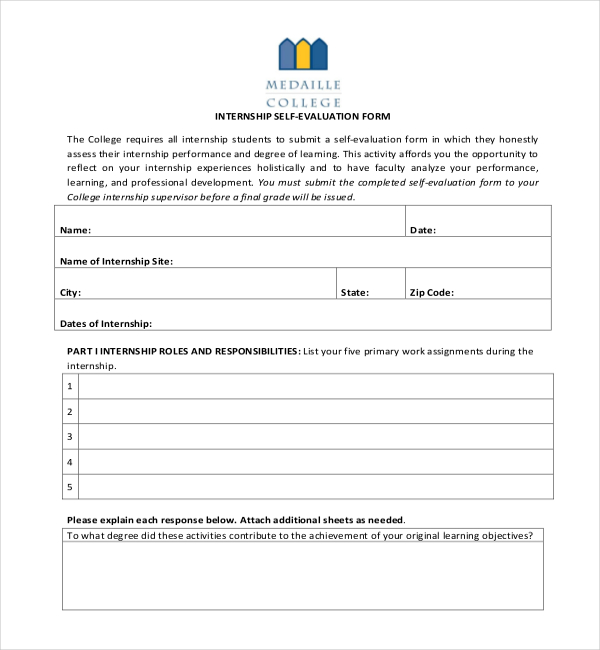
Students who take part in internships have to fill up this form at the end of the internship period so that the responsibilities are judged by the college. The self-evaluation forms as about the student’s experience while undergoing the internship. This form is submitted to the Office of Academic Affairs.
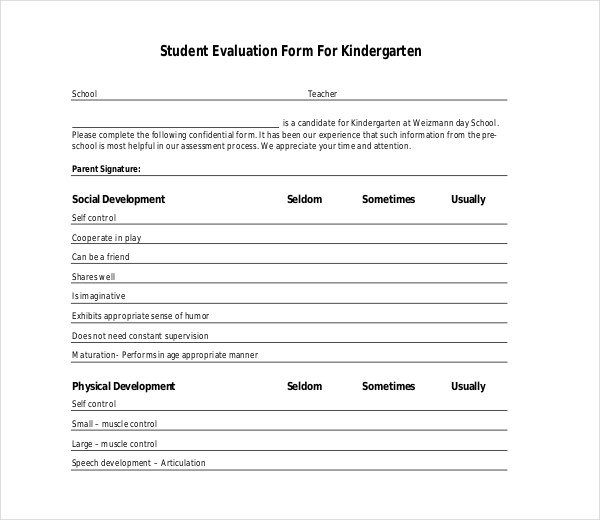
Kindergarten students are always needed to be taken care of. Their development physically, socially, mentally is observed by the evaluator through this unique form. The skills are noted, and the forms are submitted duly to the respective school. The forms are for student assessment purposes for the schools.
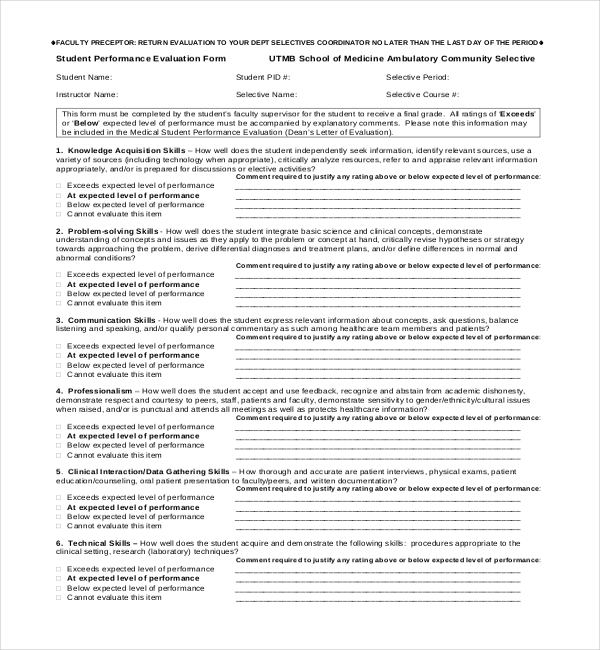
To receive a final grade by the supervisor of the medical school, they must fill up this form. This evaluation form may be included in the dean’s evaluation letter. Skills like problem solving, communication, professionalism, technical skills, written assignments, knowledge are assessed.
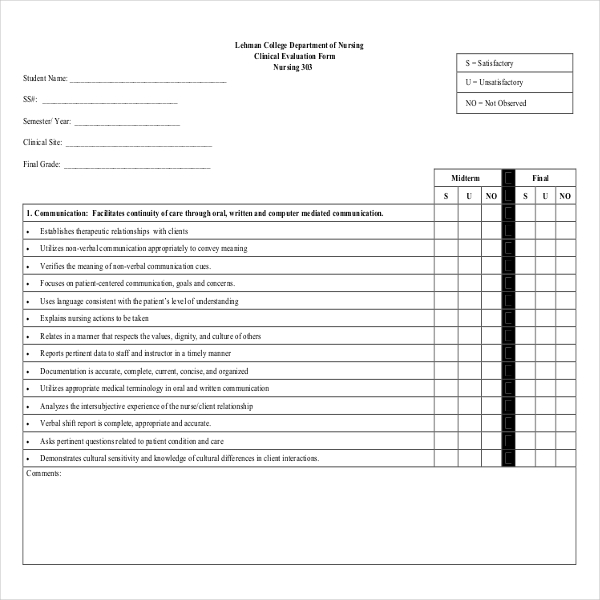
This form is for the evaluator to assess the work of the nurse in a clinical set-up. The nurse is evaluated in terms of communication skills, services provided, nurse and doctor relationship, nurse and client relationship etc. The form is submitted in time so that necessary gradations or actions are applied.
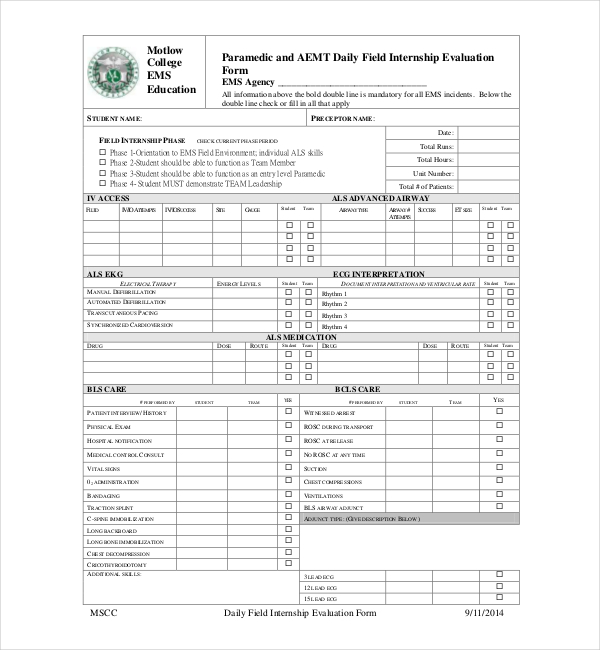
Paramedic internship is an important part of hospital training. The students are evaluated in the paramedic internship in terms of their communication skills, aptitude, team leadership, medication, report interpretations, BLS care, IV access etc. This sample form is by Motlow College EMS Education. The forms have mentioned the four phases on which the students will be evaluated.
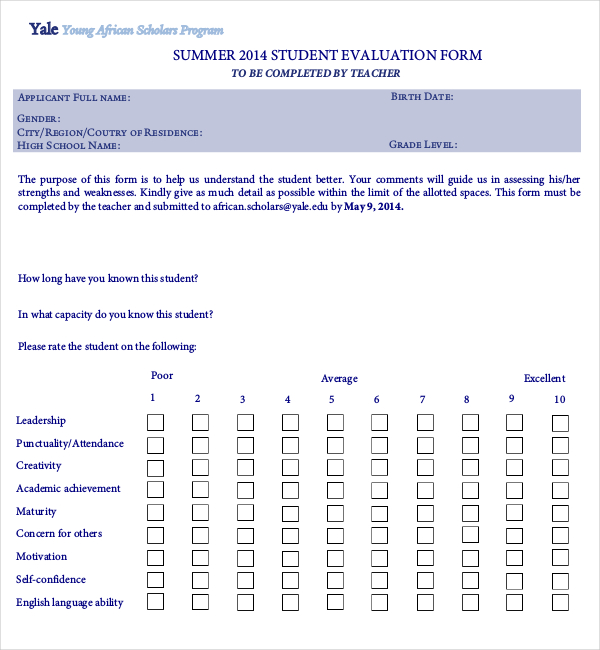
A teacher fills up the summer student evaluation forms for understanding the student better. The teacher’s comments will help the program supervisor in knowing the strength and weakness of the student better. The teachers are asked about their student’s leadership skills, creativity, maturity, motivation, empathy, language ability, self-confidence etc.
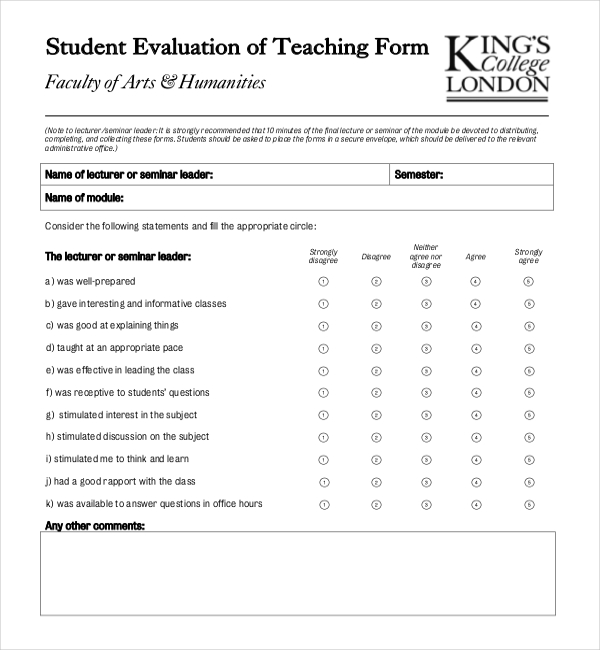
The students are asked to fill-up this form at the end of the lecture or seminar. This form enquires about the lecturer in a few questions. It is a simple form that needs to be filled up in just few minutes. These forms are then reviewed by the head of the teaching department for a discussion if the lecturer is appropriate or not.
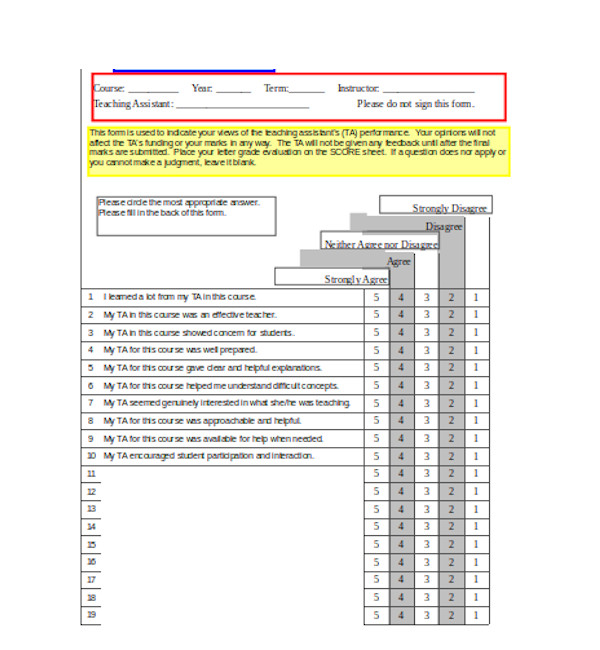
The purpose of Student Evaluation Forms is to systematically assess and document students’ academic performance, engagement, and progress in various activities. Incorporating an Activity Evaluation Form, these tools help educators identify strengths, areas for improvement, and the effectiveness of instructional strategies, ensuring a tailored approach to enhancing the educational experience and promoting student success. You can also use Proposal Evaluation Form
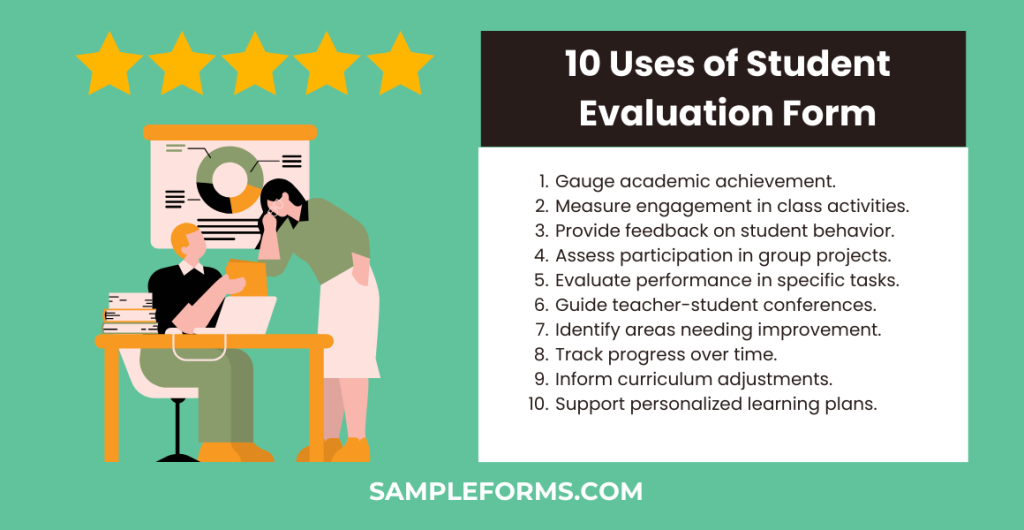
If you are wondering how to get these sample form templates, your worries must end immediately. These sample forms are easily available in our website. They can be downloaded and printed for your convenience. These evaluation forms are well tailored and can be edited accordingly. You can get these forms in both PDF and Word formats as well! The forms are designed in such a way that they have a guaranteed high success rate. The compatibility of the forms is available in both higher and lower versions. If you still require extra customization, you can inform us. We will gladly help you. Thus, you are just one click away to get hold of these important Customer Service Evaluation Form.
Writing a student evaluation involves a thoughtful and systematic assessment of the student’s performance, behavior, and overall progress. Here’s a step-by-step guide:
Remember, the purpose of a student evaluation is not only to assess past performance but also to guide future development and improvement. You should also take a look at our Sales Evaluation Form and Trainee Evaluation Form
Incorporate feedback from a Workshop Evaluation Form, focusing on specific achievements and areas for improvement. Use clear, constructive language to guide and motivate the student.
Utilize a Mentor Evaluation Form to provide real-world examples of student successes and challenges. Tailor feedback to individual learning experiences, highlighting progress and potential.
A Student Appraisal Form, akin to a Teacher Evaluation Form, assesses students’ academic progress, behavioral attitudes, and skill development, providing a comprehensive review of their performance.
Drawing from a Course Evaluation Form, emphasize strengths and accomplishments. Offer constructive feedback in a supportive manner to encourage growth and continuous learning.
Teachers use tools like the Nurse Evaluation Form to assess students’ knowledge, skills, and attitudes. Evaluations are based on observations, tests, assignments, and class participation.
In conclusion, Student Evaluation Forms serve as a cornerstone in the educational assessment landscape, offering a structured approach to gauge student performance, behavior, and overall progress. With the help of sample forms, templates, and recommendation letters, educators can harness these tools to foster an environment of continuous improvement and personalized feedback. Whether for formal evaluations or self-assessment, these forms are invaluable in driving student success and optimizing the teaching and learning experience. Embrace the power of Performance Evaluation Form to transform educational outcomes.